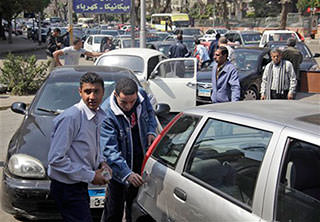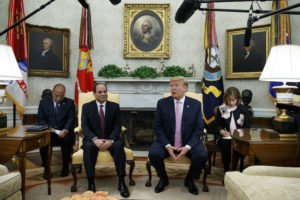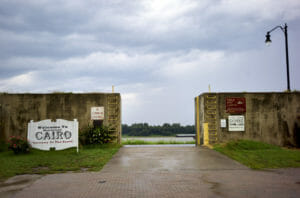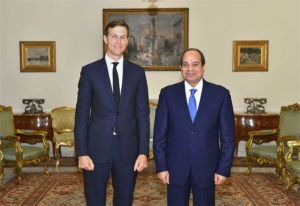Dispatches From Cairo: Fuel for the Fire
Those who can have chosen to selectively forget the worst of recent memories, but most sense a new wave of conflict, gathering at a distance and surging toward them.
We asked Lauren Unger-Geoffroy, an international artist who lives in Cairo, to share her perspective of life in Egypt after the revolution. In this entry, she writes about a fuel shortage and a sense among the people that more trouble might be approaching along with Egypt’s presidential election and the drafting of a constitution.
CAIRO — The Cairo metro has been very crowded since the seemingly inexplicable shortage of gasoline began here. Unhappy customers — many of them with bottles — wait for hours at petrol stations as lines back up traffic for kilometers. And the cycle escalates as hoarders sell thousands, even millions, of liters on the black market. A taxi driver told me he waited four hours and then was told no more gas was available.
How is it that Egypt has a shortage when huge quantities of gasoline are being sold on the international “brokering” market? And when within the last year four enormous oil-exploitation contracts have been signed with international petrol consortiums that have projected production of billions of barrels of oil in 2012? It should be remembered that Egyptian governments have at times used fuel shortages to distract the public from certain issues.
Other than the sometimes aggressive squabbling of frustrated motorists in the gas lines, things are unnaturally calm now as Cairo enjoys perfect spring weather. There is barely a trace of tear gas residue left on the ground. Everyone is smiling, feeling shakily positive. Those who can have chosen to selectively forget the worst of recent memories, but most sense a new wave of conflict, gathering at a distance and surging toward them.
There is a strange prickling at the back of the neck, an incipient panic that causes ghastly dreams and waking up in a sweat, heart pounding. Election campaigns, Egypt-style, are brewing, amid the usual government/political/social confusion about subjects the good people seldom delve into, like international and financial affairs. The questions in the hearts of the common folk now are not lofty. Is the bloodletting really over? Will everything be … somehow … OK?
Why are we wary? Generally, life is good, alhamdulillah. People will need less fuel with warm weather arriving, and there are fewer low-flying military jets on exercise missions. In a way, it’s these lulling calms that are the worst: Everyone forgets, and then, wham, some idiot upsets the fragile equilibrium and there’s another wave of unimaginable, irrational savagery.
It is beginning to dawn on everyone that Egypt’s new 70 percent Islamist Parliament has no power in state affairs. It is not the government! It does not have access to the situation room. It will be allowed to affect only the social, moral and religious aspects of the nation’s government, which appears to be in the hands of an unofficial coalition of the ruling military council, Islamists and ex-members of the Mubarak administration.
However, the precipitously created and, as we have begun to understand, essentially impotent Egyptian Parliament has finally settled on its seating issues and committees and observation of religious rites and is actually focusing on some pending governmental actions. This Parliament seems like a well-intentioned and not-so-clueless organism that just hasn’t managed to get access to the inner chamber where the real decisions are made, and that is only starting to discover its own functions. Unfortunately, in its new and as yet unclear niche, it often wanders into abstract and competing political, religious and moral divergences.
It was always intended to be an interim parliament, in fact, created principally for the task of choosing the body that will write the constitution, after or before which a president will be chosen in an election. As an experiment in democratic form, the revolution rushed a superficial, mostly powerless Parliament into existence to placate the public’s demands for representation — without a constitution or clear job description. Now, many Egyptians are distressed over the fact that the group that has been selected by the Parliament to write the constitution and laws of the country is composed mostly of Islamic party members — and very few women. [Editor’s note: On Wednesday, liberals in the 100-member assembly that was elected to draft a constitution resigned from the body in protest against what they called the Muslim Brotherhood party’s attempt to dominate the proceedings and deny representation to minority groups and other political ideologies. Other boycotts occurred later last week.]
Egyptian writers are warning that political developments in the coming months and the arrival of a new constitution could pose a serious threat to Egypt’s revolution.” We have idiots for politicians that do not read daily newspapers,” Fares Khedr, a member of the Egyptian Writers Union, told Ahram Online. “If these people are drafting our constitution, say goodbye to Egypt.” Khedr declared that the assembly needs intellectuals because they represent Egypt’s conscience.
Recently some Muslim Brotherhood MPs accused the government of secretly creating the fuel shortage to highlight the ineffectuality of the Parliament and to demonstrate the people’s dependence on the government.
Some Egyptians are demanding to know who is responsible for the shortage, but they find that they are outside the government’s black box and are raising their voice futilely.Designed to be mind-boggling, “non-information” keeps coming while the hand moves swifter than the eye. Yes, it’s all the same shell game, completely abstract to the general population. Fuel, Israel, warfare, food, water, weapons, control, ideology, ethnic dominance, territory are foremost in this multilevel game. Of course the media do little to help public understanding.
In the face of distractions, we cannot keep focused on the issues that will be of the most importance to the nation in the long run. The latest target of outrage involves foreign nongovernmental organization workers. Currently many bitter jokes, cartoons and discussions reflect the public’s displeasure over the release of a handful of American NGO workers who were covertly flown out of the country in a chartered jet — after U.S. payment of what amounted to a ransom — while their Egyptian NGO co-workers stayed to face treason charges. I guess you had to know someone important in Washington to get that kind of service.
The U.S. budget for that escape included nearly $5 million in bail. (Although the bail was for 16 Americans charged in the case, nine had already left Egypt when the remaining seven were flown out early in March.) All of them, plus a number of other foreigners and Egyptians, had been charged with receiving foreign funding from sources that sought to manipulate Egyptian unrest. All of the accused vehemently denied the charges, insisting they were here doing nothing more than democracy-building work.
In truth, some of them had been invited to be monitors in the recent parliamentary elections, so there is divided opinion here about their guilt, but the covertness and blatant, privileged treatment of the Americans by the Egyptian government, in contrast to the way their Egyptian counterparts were treated, have sparked public resentment.
Some Parliament members are demanding to know who exactly was responsible for “selling” the Americans’ liberation and are urging that all of the charged Egyptians be granted a similar degree of leniency.
Chatter on social media points to “another revolution.” Online and in continuing protest gatherings, support networks are starting to pull together to confront the disputes and uprisings expected to stem from the impending election and constitution-drafting.
Recently there were demonstrations demanding dignity and justice for the victims of February’s football riot. Afterward, as usual, a confrontation between revolutionary football fans and authorities occurred. It left a few dead and injured. But there was no big body count … a good sign.
My friend Hazem came by recently for a small social gathering. He was late because he had to take the metro [public rail transit system] — he had no gas in his car. He feels that the situation in Egypt is positive. He is tired of fighting and willing to let the Muslim Brotherhood decide matters, even though he doesn’t trust the organization. “What would be so bad about Shariah besides no more girls in bathing suits?” he asked, half-joking, as he drank his tea. He is ready to believe the worst is over. Last month, his three younger brothers were killed in the senseless Portsaid stadium massacre.
When the call to prayer jolts my windows at 4:30 a.m., I will pray for peace and the best outcome and that Egypt and the world as it turns will grind all this heavy, spiky, rough grist into something that can nourish people.
Salaam.
Your support matters…Independent journalism is under threat and overshadowed by heavily funded mainstream media.
You can help level the playing field. Become a member.
Your tax-deductible contribution keeps us digging beneath the headlines to give you thought-provoking, investigative reporting and analysis that unearths what's really happening- without compromise.
Give today to support our courageous, independent journalists.



You need to be a supporter to comment.
There are currently no responses to this article.
Be the first to respond.